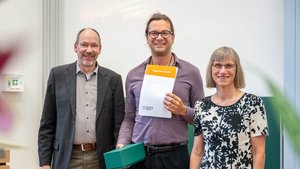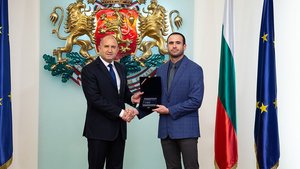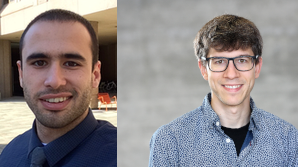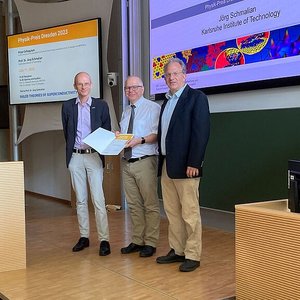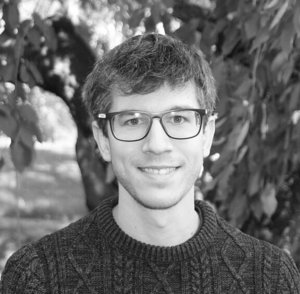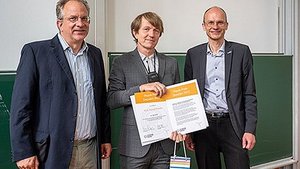Highlights
Awards and Honors
Prof. Matthieu Wyart awarded the "Physik Preis Dresden 2024"
On 18 June 2024, the French physicist Prof. Matthieu Wyart (EPFL, École Polytechnique Fédérale de Lausanne) was awarded the Physik Preis Dresden 2024. The theoretical physicist is being honoured for his pioneering contributions to various problems of complex systems, in particular the theory of financial markets, the physics of disordered and glassy systems as well as the theory of neural networks and machine learning. The Physik Preis Dresden is awarded annually jointly by the Dresden University of Technology and the Max Planck Institute for the Physics of Complex Systems (MPI-PKS).
Matthieu Wyart completed his PhD in Paris in 2005, where he worked together with J.-P. Bouchaud. During this time, he developed a model of price response functions in electronic markets, which became a standard in the industry. In the field of physics of disordered systems, he made an important breakthrough very early on by explaining how the surplus of soft modes in closely-packed systems of particles is controlled by their disordered geometry. This work elegantly solved the long-standing problem of the origin of the so-called boson peak in glasses with repulsive interactions. As a postdoc, he moved to Harvard and then Princeton before becoming an assistant and associate professor at New York University. He has been a professor at EPF Lausanne since 2015.
In recent years, Matthieu Wyart's original approaches and way of reasoning have had a strong impact and brought new insights into the physics of disordered systems. More recently, he has made significant contributions to the problem of the nature of the glass transition. In particular, his work suggests that increasing local energy barriers control the slowing down of dynamics in supercooled liquids, as opposed to co-operative effects.
The numerous original approaches to solving problems in different fields and disciplines are testimony to his extraordinary scientific excellence. In recognition of his outstanding contributions to the physics of complex and disordered systems, the Dean of the Faculty of Physics at Dresden University of Technology, Prof. Gesche Pospiech, together with Prof. Frank Jülicher, Director at the MPI-PKS, awarded the Physik Preis Dresden 2024 to Matthieu Wyart on 18 June 2024 as part of the Physics Colloquium.
The Physik Preis Dresden, endowed with 5,000 euros, was founded in 2015 by the Dresden physicist Prof Peter Fulde (1936-2024), the founding director of the MPI-PKS, and has been awarded annually to renowned scientists since 2017. The award winners are selected by a joint commission of the Dresden University of Technology and the MPI-PKS. In addition to the central criterion of scientific excellence, it is particularly important for the decision that the work of the award winners is of particular importance for the cooperation between the two DRESDEN-concept partners MPI-PKS and TUD and that their connection has been further strengthened in the long term.
weiterlesenAwards and Honors
Marin Bukov receives John Atanasoff Award
The John Atanasoff Award, named after the creator of the first electronic computer - the famous scholar of Bulgarian descent, John Atanasoff, was first awarded in 2003 in support of the personal achievements of young Bulgarian researchers working in the fields of informatics and information technology. Marin Bukov, group leader at MPI-PKS, is among this year's awardees ”for his outstanding contributions to the field of artificial intelligence applied to quantum technologies, and for his role in the development of efficient innovative research and education tools used worldwide”. Congratulations, Marin!
weiterlesenAwards and Honors
Two ERC Starting Grants awarded to group leaders at MPI-PKS
The European Research Council (ERC) has announced early-career top researchers across Europe who will receive a starting grant. The prestigious grants enable the best young researchers in Europe to build their own teams and to conduct pioneering research across all disciplines. This year, two of these grants were awarded to research group leaders at the MPI-PKS: Marin Bukov for his proposal "Nonequilibrium Many Body Control of Quantum Simulators" and Ricard Alert for his proposal "The Spectrum of Fluctuations in Living Matter". Congratulations!!
weiterlesenAwards and Honors
"Physik-Preis Dresden 2023" awarded to Professor Jörg Schmalian
On July 11, 2023, Prof. Jörg Schmalian from the Karlsruhe Institute of Technology received the "Physik-Preis Dresden 2023" (Dresden Physics Prize), jointly awarded by the TU Dresden and the Max Planck Institute for the Physics of Complex Systems (MPI-PKS).
The "Physik-Preis Dresden" has been established, with a generous donation by Prof. Peter Fulde, to promote cooperation between the Max Planck Institute for the Physics of Complex Systems and the Faculty of Physics of TU Dresden. It is geared towards outstanding researchers whose research is of particular interest to scientists in Dresden. This year's recipient, Prof. Jörg Schmalian, fits this condition perfectly.
Jörg Schmalian studied physics in Leipzig and Merseburg and graduated from the Technische Hochschule Merseburg in 1990. The German reunification made it possible for him to obtain a doctorate in physics in 1993 from Freie Universität Berlin under the supervision of Karl Bennemann. He stayed at FU Berlin as a postdoc before joining the group of David Pines at the University of Illinois at Urbana-Champaign in 1997. In 1999, Jörg Schmalian moved back to Europe and became a fellow of St. Catherine's College at the University of Oxford. In the same year, he accepted an offer for a tenure-track faculty position at Iowa State University, in connection with a researcher position at Ames National Lab. Jörg Schmalian quickly moved up through the ranks to become full professor in 2007. In 2011, he moved to the Karlsruhe Institute of Technology as a professor. Currently, he is the Dean of the Faculty of Physics of KIT. Jörg Schmalian has been a visiting professor at Royal Holloway University, University of Paris Diderot, and Stanford University. He has received multiple honors, among them a fellowship of the American Physical Society and the 2022 John Bardeen Prize for Theory of Superconductivity.
Jörg Schmalian is an internationally highly visible theoretical physicist with a broad range of interests. He has published over 200 research papers with over 10.000 citations. Jörg Schmalian started to work on strongly correlated electrons and superconductivity during his doctoral studies, at that time with a focus on cuprate high-temperature superconductors. He later made significant contributions to superconductivity and other ordering phenomena in iron-based and organic compounds as well as more generally on the physics of coupled order parameters. It is characteristic for Jörg Schmalian's work that he has both established conceptual foundations and modeled and predicted specific phenomena, working close to experiments. Jörg Schmalian's papers on spin-fluctuation-mediated superconductivity and on nematic order have become standard references in these fields. Moreover, Jörg Schmalian's works on quantum criticality and transport in graphene have strongly advanced the hydrodynamics of electron liquids. They were essential for identifying graphene as a readily available system in which many aspects of hydrodynamical transport can be studied experimentally. Last but not least, Jörg Schmalian has made significant contributions to the field of disordered systems. He has worked on electronic glasses and disordered magnets as well as on novel superconducting phases in models with strong disorder.
Jörg Schmalian has multiple connections to Dresden, not only to theoretical physics groups at MPI-PKS and TUD. There is also strong overlap with experimental work done at IFW Dresden, at the Helmholtz-Zentrum Dresden-Rossendorf, and by Andrew Mackenzie's group at the Max Planck Institute for Chemical Physics of Solids. This is exemplified by a new paper on strontium ruthenate with Jörg Schmalian and Andrew Mackenzie as two of the authors.
The Physik-Preis Dresden for the year 2023 honors Jörg Schmalian as an outstanding theoretical condensed-matter physicist with strong connections to Dresden and will hopefully help to strengthen these connections further.
weiterlesenAwards and Honors
IUPAP Medal for Frank Jülicher
Frank Jülicher shares the inaugural 2023 IUPAP Medal for the Physics of Life
The International Union of Pure and Applied Physics (IUPAP) has awarded the 2023 IUPAP Medal for the Physics of Life jointly to John J. Hopfield and to Frank Jülicher, director at the Max Planck Institute for the Physics of Complex Systems. The citation reads “For his key contributions to biological active matter physics, shedding light on the physical mechanisms that underlie cellular processes, including cooperative molecular motors; hearing; flagellar beat; active gels, fluids, and droplets; the active cell cortex; tissue growth and patterning; protein phase separation in cells; and self-organization of active surfaces.”
The IUPAP Medal for the Physics of Life is a new award of the International Union for Pure and Applied Physics (IUPAP), presented by its C6 Commission on Biological Physics every three years, at the IUPAP International Conference on Biological Physics (ICBP). The Award, consisting of a gilded medal and a certificate, recognizes outstanding achievements in Biological Physics, regardless of the country where the research has been done, the age, or the employment status of the nominee.
Congratulations, Frank!
weiterlesenThe International Union of Pure and Applied Physics (IUPAP) has awarded the 2023 IUPAP Medal for the Physics of Life jointly to John J. Hopfield and to Frank Jülicher, director at the Max Planck Institute for the Physics of Complex Systems. The citation reads “For his key contributions to biological active matter physics, shedding light on the physical mechanisms that underlie cellular processes, including cooperative molecular motors; hearing; flagellar beat; active gels, fluids, and droplets; the active cell cortex; tissue growth and patterning; protein phase separation in cells; and self-organization of active surfaces.”
The IUPAP Medal for the Physics of Life is a new award of the International Union for Pure and Applied Physics (IUPAP), presented by its C6 Commission on Biological Physics every three years, at the IUPAP International Conference on Biological Physics (ICBP). The Award, consisting of a gilded medal and a certificate, recognizes outstanding achievements in Biological Physics, regardless of the country where the research has been done, the age, or the employment status of the nominee.
Congratulations, Frank!
Awards and Honors
IUPAP Early Career Prize for Ricard Alert
Ricard Alert receives the IUPAP Early Career Scientist Prize in Biological Physics (C6) 2023
The International Union of Pure and Applied Physics (IUPAP) has awarded the 2023 Early Career Prize 2023 in Biological Physics to Ricard Alert, research group leader at the Max Planck Institute for the Physics of Complex Systems and the Center for Systems Biology Dresden for "revealing how new phenomena in active matter underlie a wide range of biological processes, from the spreading of epithelial tissues, to turbulent-like flows in cytoskeletal networks, to the formation of fruiting bodies in bacterial colonies".
The IUPAP C6 Early Career Scientist Prize recognizes exceptional achievements of scientists in the field of Biological Physics at a relatively early stage of their career. The recipients must be no more than eight years past the award of their PhDs (excluding career interruptions), and they are expected to have demonstrated significant scientific achievements and display exceptional promise for future achievements in Biological Physics.
Congratulations, Ricard!
weiterlesenThe International Union of Pure and Applied Physics (IUPAP) has awarded the 2023 Early Career Prize 2023 in Biological Physics to Ricard Alert, research group leader at the Max Planck Institute for the Physics of Complex Systems and the Center for Systems Biology Dresden for "revealing how new phenomena in active matter underlie a wide range of biological processes, from the spreading of epithelial tissues, to turbulent-like flows in cytoskeletal networks, to the formation of fruiting bodies in bacterial colonies".
The IUPAP C6 Early Career Scientist Prize recognizes exceptional achievements of scientists in the field of Biological Physics at a relatively early stage of their career. The recipients must be no more than eight years past the award of their PhDs (excluding career interruptions), and they are expected to have demonstrated significant scientific achievements and display exceptional promise for future achievements in Biological Physics.
Congratulations, Ricard!
Awards and Honors
"Physik-Preis Dresden 2022" awarded to Professor Tomaž Prosen
On May 24, 2022, Prof. Tomaž Prosen from the University of Ljubljana in Slovenia received the "Physik-Preis Dresden" (Dresden Physics Prize), jointly awarded by the TU Dresden and the Max Planck Institute for the Physics of Complex Systems (MPI-PKS). The theoretical physicist receives the award for his outstanding work on quantum mechanical many-body systems, nonequilibrium statistical physics, quantum information, classical chaos and quantum chaos.
Tomaž Prosen has authored over 200 publications on this broad range of topics, which have over 7000 citations and are recognized in expert circles worldwide. In 2016, he received a prestigious ERC Advanced Grant. The award ceremony took place at a festive colloquium in the Recknagel Building of the TU Dresden, preceded by a reception. Prof. Carsten Timm, Dean of the Faculty of Physics, gave the welcome address, and Prof. Roderich Moessner of MPI-PKS delivered the laudation.
The Physik-Preis Dresden was endowed in 2015 by Dresden physicist Prof. Peter Fulde, the founding director of the MPI-PKS. The prize winners are determined by a joint commission of the TU Dresden and the MPI-PKS. In addition to the central criterion of scientific excellence, it is particularly important for the decision that the work of the award winners is of special significance for the cooperation between the two DRESDEN-concept partners MPI-PKS and TU Dresden and that their connection has been further strengthened in the long term. The 2022 awardee, Prof. Tomaž Prosen, has a wide range of connections to the professorships at the Institute for Theoretical Physics at TU Dresden and at MPI-PKS due to his broad scientific orientation.
weiterlesenAwards and Honors
Funding to understand emergent physical properties of chromatin using synthetic nuclei
ERC Consolidator Grant for Jan Brugués
Today, the European Research Council (ERC) announced the winners of its latest Consolidator Grant competition for ambitious mid-career researchers. Jan Brugués, research group leader both at the Max Planck Institute of Molecular Cell Biology and Genetics (MPI-CBG) and the Max Planck Institute for the Physics of Complex Systems (MPI-PKS) is one of the 313 laureates who were awarded the 2022 ERC Consolidator Grants. The funding is part of the EU’s Horizon Europe programme, and the winners will receive in total 632 million Euros to tackle big scientific questions. In total, 2,652 applicants submitted proposals and 12% of them will receive the funding. Male and female applicants were equally successful in winning the grants. The future grantees will carry out their projects at universities and research centers across 24 EU Member States and associated countries. This new round of grants will create an estimated 1,900 jobs for postdoctoral fellows, PhD students and other staff at 189 host institutions.
Jan receives the grant for his project “Understanding emergent physical properties of chromatin using synthetic nuclei.” The main goal of this project is to resolve how the physics of molecular-scale activities result in the material properties of chromatin and how those contribute to chromatin organization and function. Jan Brugués explains: “With my project, I hope to provide a physical description of the material state of chromatin across different scales and contribute to reveal the basic physical principles that govern nuclear organization and function.”
Congratulations Jan!
weiterlesenToday, the European Research Council (ERC) announced the winners of its latest Consolidator Grant competition for ambitious mid-career researchers. Jan Brugués, research group leader both at the Max Planck Institute of Molecular Cell Biology and Genetics (MPI-CBG) and the Max Planck Institute for the Physics of Complex Systems (MPI-PKS) is one of the 313 laureates who were awarded the 2022 ERC Consolidator Grants. The funding is part of the EU’s Horizon Europe programme, and the winners will receive in total 632 million Euros to tackle big scientific questions. In total, 2,652 applicants submitted proposals and 12% of them will receive the funding. Male and female applicants were equally successful in winning the grants. The future grantees will carry out their projects at universities and research centers across 24 EU Member States and associated countries. This new round of grants will create an estimated 1,900 jobs for postdoctoral fellows, PhD students and other staff at 189 host institutions.
Jan receives the grant for his project “Understanding emergent physical properties of chromatin using synthetic nuclei.” The main goal of this project is to resolve how the physics of molecular-scale activities result in the material properties of chromatin and how those contribute to chromatin organization and function. Jan Brugués explains: “With my project, I hope to provide a physical description of the material state of chromatin across different scales and contribute to reveal the basic physical principles that govern nuclear organization and function.”
Congratulations Jan!
Awards and Honors
Artificial intelligence and stochastic models to guide personalized cancer therapy
Steffen Rulands receives funding within the REDESIGN consortium to bring personalized cancer therapy to patients using organoids and predictive models.
The Saxon Ministry for Science, Arts and Tourism is funding four research projects for individualized cancer therapy with around 2.3 million euros. The projects will start this year and run for three years. One of the projects is the REDESIGN consortium with the goal to develope personalized medical therapy of Gastric Cancer. This type of cancer is difficult to treat once resistance to standard chemotherapy develops. Therefore, there is a need to tailor the therapy to each patient. The REDESIGN consortium is led by Daniel E. Stange (University Hospital Carl Gustav Carus Dresden), in collaboration with Steffen Rulands, Bon-Kyoung Koo (Institute of Molecular Biotechnology of the Austrian Academy of Sciences), and Mette N. Svendsen (University of Copenhagen).
Steffen Rulands will use functional drug response data generated from patient-derived organoids to predict the efficacy of different regimines of chemotherapy. These organoids are initially grown by clinical research labs from patient tumor tissue samples’and then exposed to varying cocktails of chemotherapy. Organoids are sequenced before and after treatment to detect mutations that may affect the outcome of therapy. Moreover, organoid growth speed, among other parameters, are measured during the treatment.
These datasets will be used by Steffen's group to develop quantitative predictions of treatment efficiency using two complementary approaches, stochastic models and deep neural networks. The combination of the two methods will allow for high predictive and explanatory power while tackling the complexity of the data. This complexity arises from the presence of mixed populations of cells in the tumor and different constellations of mutations between tumors from different patients.
Eventually, the developed model will help understand how resistance to therapy develops. More importantly, it will predict how any given patient would respond to chemotherapy based on the constellation of mutations found in the tumor. It will also assess the likelihood of tumor relapse in patients for each possible therapeutic approach and recommend the therapy that targets the tumor cells carrying mutations that make the tumor more aggressive and relapsing.
weiterlesenAwards and Honors
Physik-Preis Dresden zum fünften Mal verliehen
Am 6. Juli 2021 wurde der „Physik-Preis Dresden“ der TU Dresden und des Max-Planck-Instituts für Physik komplexer Systeme (MPI-PKS) zum fünften Mal verliehen.
Der Physik-Preis Dresden 2021 geht an Professor Gijsje Koenderink von der Technischen Universität Delft. Gijsje Koenderink ist eine herausragende experimentelle Biophysikerin mit einer Reihe von bahnbrechenden Arbeiten zur Zellmechanik und zellulären Krafterzeugung.
In Anerkennung ihrer hervorragenden Beiträge zur Physik der Zellen erhält Gijsje Koenderink den Dresdner Physikpreis 2021, der gemeinsam vom Max-Planck-Institut für Physik komplexer Systeme und der TU Dresden verliehen wird.
Die Forschung von Gijsje Koenderink ist von großem Interesse für eine Reihe von Forschungsgruppen in Dresden, insbesondere im Rahmen des Exzellenzclusters "Physik des Lebens". Die Verleihung des Physik-Preis Dresden 2021 an Professor Koenderink schafft eine wertvolle Verbindung zwischen ihrer Forschungsgruppe und der Forschung auf den Gebieten Polymerphysik, weicher kondensierter Materie, Biophysik und Zellbiologie in Dresden.
Gastgeber des Abends, Prof. Dr. Frank Jülicher, Direktor am Max-Planck-Institut für Physik komplexer Systeme, war überaus erfreut, dass mit Gijsje Koenderink eine so bedeutende internationale Forscherpersönlichkeit geehrt wurde.
Der Physik-Preis Dresden wurde 2015 von dem Dresdner Physiker Prof. Peter Fulde, dem Gründungsdirektor des MPI-PKS gestiftet. Die Preisträger werden von einer gemeinsamen Kommission der TU Dresden und des MPI-PKS bestimmt. Neben dem zentralen Kriterium der wissenschaftlichen Exzellenz ist für die Entscheidung vor allem wichtig, dass die Arbeiten der Preisträger für die Zusammenarbeit zwischen beiden Dresden-concept Partnern MPI-PKS und TU Dresden von besonderer Bedeutung sind und deren Verbindung langfristig weiter gestärkt wurde.
weiterlesen

